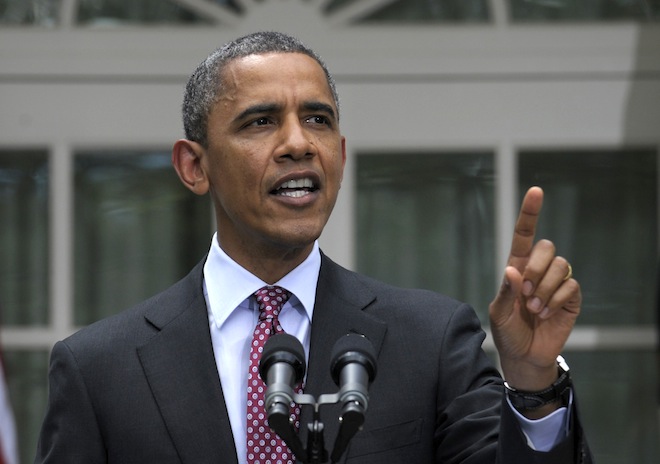WASHINGTON (AP) — President Barack Obama on Friday will call for ending the government’s control of phone data from millions of Americans, a senior administration official said. The move marks a significant change to the National Security Agency’s controversial bulk phone record collection program.
Obama will announce the move in a highly anticipated speech Friday morning at the Justice Department. However, the official said Obama will not recommend who should control the phone data and will instead call on the attorney general, intelligence community and Congress to make that determination.
A presidential review panel has recommended moving the data to the telephone companies or a third party. However, the phone providers have balked at changes that would put them back in control of the records.
The official insisted on anonymity because this person was not authorized to discuss the president’s decision by name.
Obama’s speech caps a months-long administration review of the widespread NSA surveillance program, made public by former systems analyst Edward Snowden. Obama had been widely expected to back mostly modest changes to the surveillance network at home and abroad, while largely leaving the framework of the controversial programs in place.
The president’s address may leave many questions about reforms to the surveillance programs unanswered. He was expected to recommend further study on several of the 46 recommendations he received from a presidential review group and ideas for expanding privacy protections to foreigners.
Many of the changes Obama was expected to announce appeared aimed at shoring up the public’s confidence in the spying operations. That included a move to add an independent privacy advocate to the secretive court that approves the phone record collections.
In previewing Obama’s speech, White House spokesman Jay Carney said Thursday that the president believed the government could make surveillance activities “more transparent in order to give the public more confidence about the problems and the oversight of the programs.”
Officials said that even after months of studying the surveillance issues, Obama was still grappling with his decisions in the hours leading up to the speech.
What appeared certain was that the NSA’s phone record gathering would continue in some form.
U.S. officials familiar with the White House review said the president would broadly call for changes in the program but would leave the specifics to Congress.
The move would thrust the decision-making into the hands of lawmakers, who are at odds over the future of the surveillance programs, raising questions about how quickly change would come, if it comes at all. The officials spoke on condition of anonymity because they were not authorized to discuss the review by name ahead of Obama’s speech.
Obama might highlight modest changes to the phone records program he could take using executive action, including reducing the amount of time U.S. data could be held from its current limit of five years. He also was expected to detail guidelines for when the NSA could actually gather bulk data.
Privacy groups have been pressing for guidelines that significantly narrow the amount of data collected from Americans. But the officials were banking on broad rules that do little to actually limit their activities.
The president also was expected to announce changes in U.S. surveillance operations overseas, including ratcheting up oversight to determine whether the government will monitor communications of friendly foreign leaders.
The leaks from Snowden, a fugitive now living in Russia, included revelations the U.S. was monitoring the phone of German Chancellor Angela Merkel, sparking intense anger in Europe.
___
Follow Julie Pace on Twitter at http://twitter.com/jpaceDC and Kimberly Dozier at http://twitter.com/kimberlydozier
Copyright 2014 The Associated Press. All rights reserved. This material may not be published, broadcast, rewritten or redistributed.






